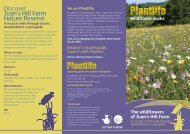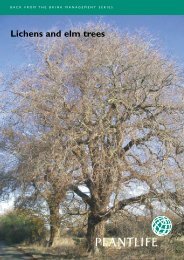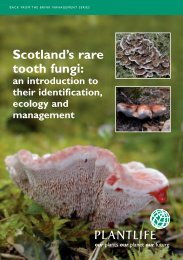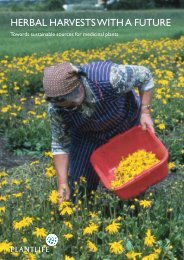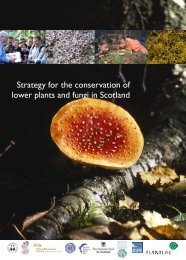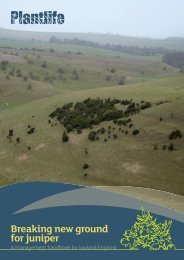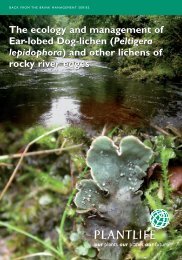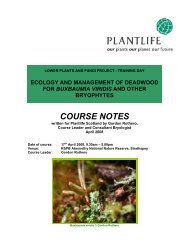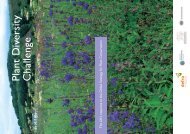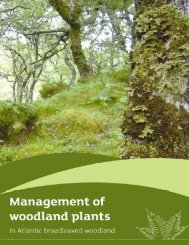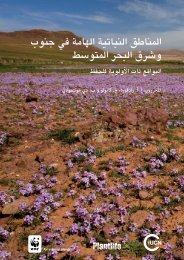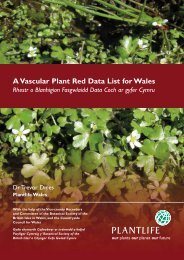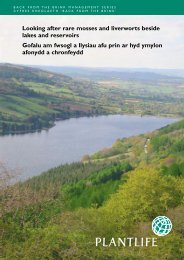important plant areas in central and eastern europe - Plantlife
important plant areas in central and eastern europe - Plantlife
important plant areas in central and eastern europe - Plantlife
Create successful ePaper yourself
Turn your PDF publications into a flip-book with our unique Google optimized e-Paper software.
Introduction<br />
DANA TURONOVA<br />
Threats to IPAs<br />
The top threats to IPAs <strong>in</strong> the seven partner countries are poor forestry practices,<br />
tourist development, agricultural <strong>in</strong>tensification, l<strong>and</strong> ab<strong>and</strong>onment, transport <strong>and</strong> urban<br />
development, poor water management systems, habitat fragmentation, <strong>in</strong>vasive species<br />
<strong>and</strong> eutrophication.<br />
poor forestry practices threaten 44% of IPAs (<strong>in</strong>tensified forest management 27%,<br />
afforestation 20%, deforestation 16%)<br />
tourist <strong>and</strong> recreation development threatens 38% of IPAs<br />
agricultural <strong>in</strong>tensification or expansion threatens 29% of IPAs (graz<strong>in</strong>g 16%, general<br />
11%, arable 9%)<br />
l<strong>and</strong> ab<strong>and</strong>onment threatens 28% of IPAs<br />
development, transport, <strong>in</strong>frastructure, urban <strong>and</strong> <strong>in</strong>dustrial, threatens 25% of IPAs<br />
poor water management systems threaten 22% of IPAs (general 15%, dra<strong>in</strong>age 7%,<br />
dredg<strong>in</strong>g <strong>and</strong> canalisation 4%)<br />
habitat fragmentation threatens 21% of IPAs<br />
the consequences of <strong>in</strong>vasive <strong>plant</strong> species threaten 18% of IPAs<br />
eutrophication (nutrient enrichment) threatens 15% of IPAs<br />
Fungi <strong>and</strong> lower <strong>plant</strong>s are also <strong>important</strong><br />
groups <strong>in</strong> IPA identification.<br />
The most significant threats to IPAs are consistent <strong>in</strong> the seven partner countries.<br />
Unsusta<strong>in</strong>able tourism, l<strong>and</strong> ab<strong>and</strong>onment <strong>and</strong> agricultural practices, poor forestry<br />
practices, <strong>in</strong>vasive species control, damag<strong>in</strong>g transport development, <strong>and</strong> poor water<br />
management systems, should be targeted at the national <strong>and</strong> regional level through<br />
policy <strong>and</strong> fund<strong>in</strong>g <strong>in</strong>itiatives.<br />
Protection <strong>and</strong> management of IPAs<br />
626 IPAS (79%) have some form of legal protection, either completely or partially<br />
cover<strong>in</strong>g the site.<br />
170 IPAs (21%) currently have no legal protection.<br />
In the five new member states of the EU, the Czech Republic, Estonia, Pol<strong>and</strong>, Slovakia<br />
<strong>and</strong> Slovenia, 399 IPAs out of a total of 510 IPAs <strong>in</strong> those countries, have been proposed<br />
to the European Commission as Special Areas of Conservation (SAC) under the EU<br />
Habitats Directive <strong>and</strong> will form part of the Natura 2000 network.<br />
Although 626 IPAs currently have some form of legal protection it is <strong>important</strong> to make it<br />
clear that there are many different levels of protection <strong>and</strong> conservation management <strong>in</strong><br />
protected <strong>areas</strong>. Protected area managers may not be aware of the importance of some of<br />
the <strong>plant</strong> species <strong>and</strong> habitats at that site, or there may be <strong>in</strong>sufficient capacity or fund<strong>in</strong>g to<br />
conserve those species <strong>and</strong> habitats adequately. Data are be<strong>in</strong>g collected on the level of<br />
management plans at IPAs <strong>and</strong> these data will be used to prioritise conservation action.<br />
15




